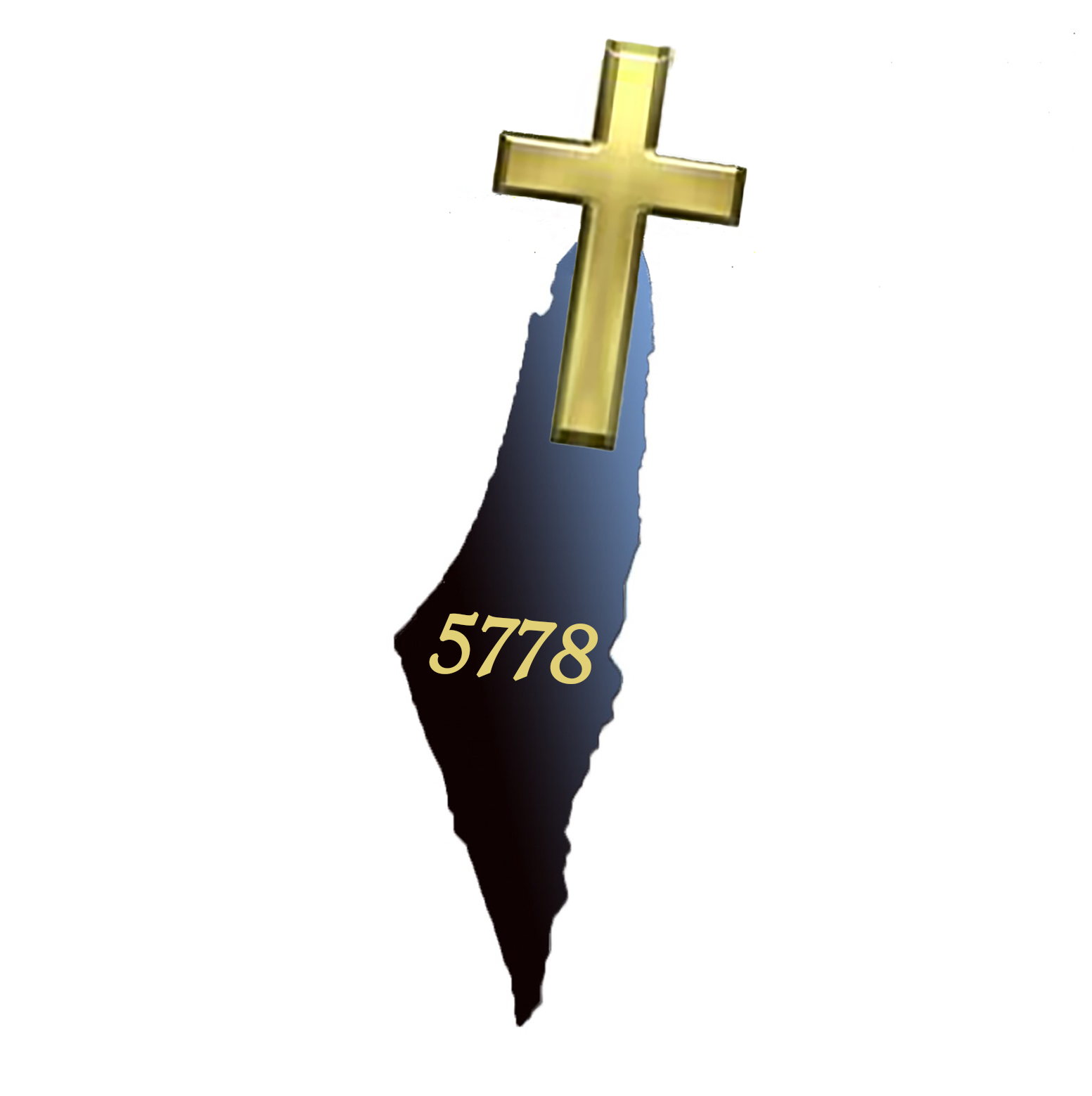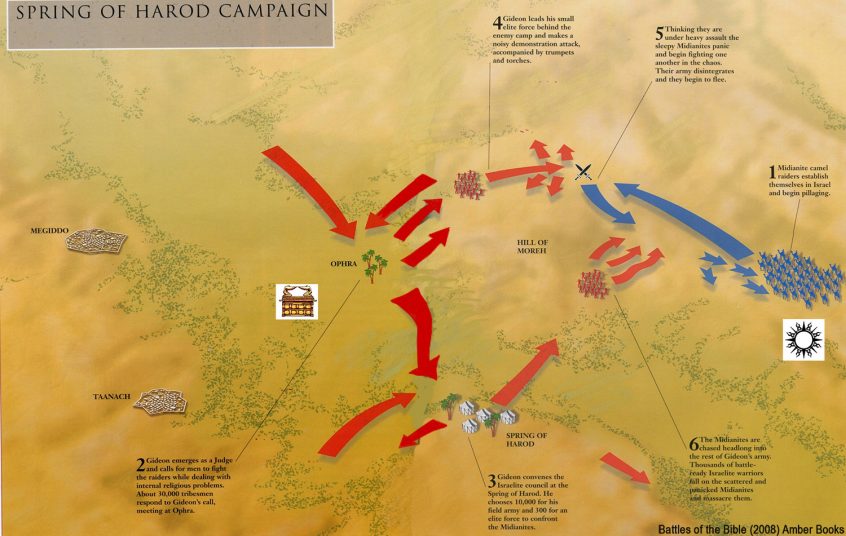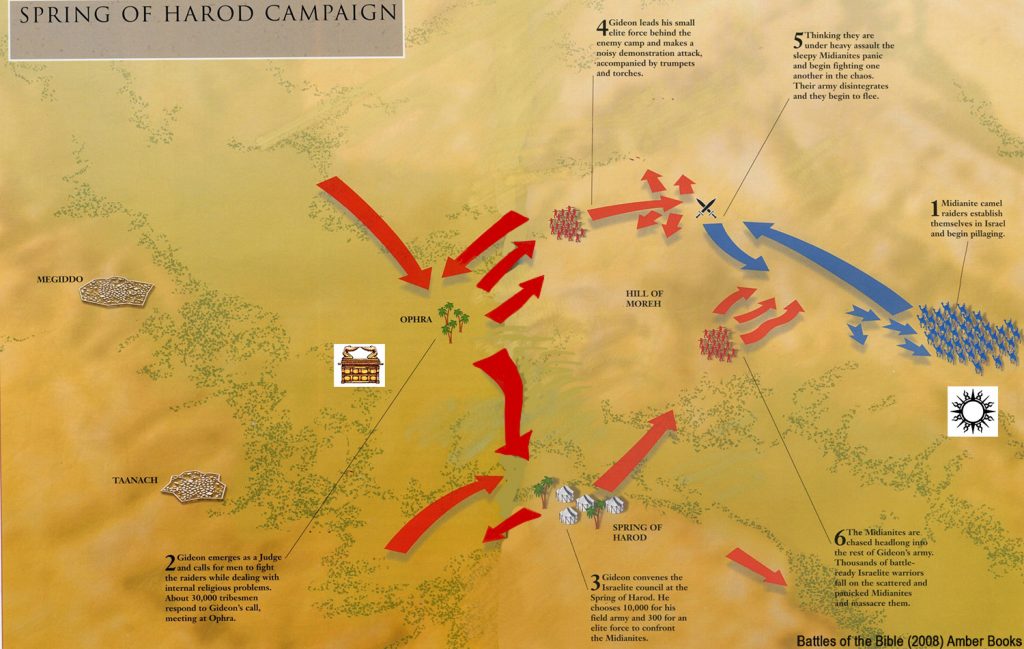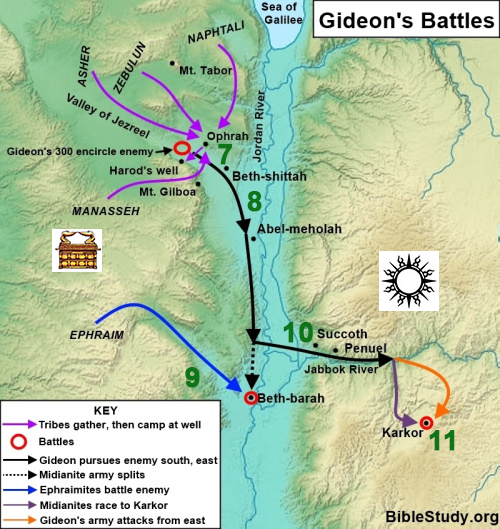Bible Battle #21 – C. 1208 BC
Bible Battles. Spring of Harod, Gideon’s victory ended the Midianite Oppression over Israel. Gideon was bold, he asked God for a sign by putting out a fleece. He followed God and took command of a large force but God reduced it to only 300 soldiers. Gidon had faith in God and defeated the Midianites. Sadly, in the end, Gideon succumbed to carnality and indulged in the very sin which had led the Israelites to servitude.
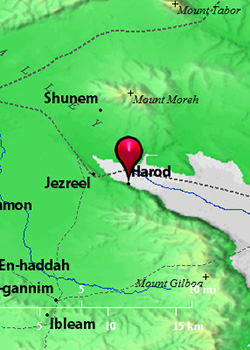
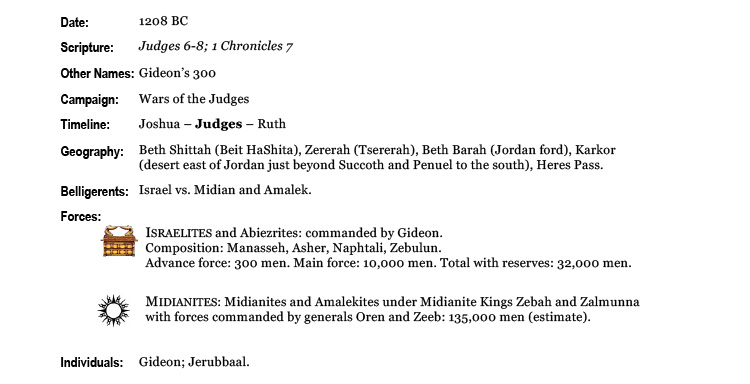
 Bible Battle BACKGROUND
Bible Battle BACKGROUND
Spring of Harod
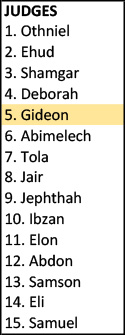
During the period of the judges, Israel was not united but, instead, a confederation of tribes. Under these circumstances, it was difficult for the people to fight off foreign incursions in a unified way. Instead, it was the tribes under attack that had to do it on their own. A new leader, a judge, was usually able to unite the tribes during these times.
After Deborah and Barak, the people went back to evil ways again, worshiping Baal and Asherah, which brought them under the dominance of Midian for seven years.
The Midianites opress Israel
Midian was one of six sons of Abraham and Keturah (the woman Abraham married after Sarah died). Midian was the half-brother of Isaac. His descendants, the Midianites, had been a blessing at one point when they took Moses in after he fled from Egypt. However now they were assigned as a curse to Israel.
Together with the help of the Amalekites 1 also, Ishmaelites, the Midianites 2, would conduct a systematic annual raid on the Israelite harvest. As nomads, they brought their camels from the desert to plunder from Jezreel all the way to Gaza during harvest season. The camel can carry up to one thousand pounds in weight, making them perfect for these raids. While the Israelites hid in highland caves and fortifications for protection, in doing so, they left their settlements fields and vineyards open for plunder. It was a time of economic depression and starvation for the Israelites.
 NOTHING NEW UNDER THE SUN
NOTHING NEW UNDER THE SUN
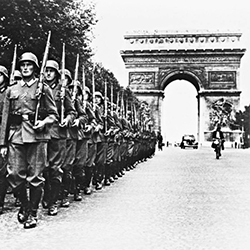
In June 1940 the French Army declared Paris an open city upon the lightning advance of the German armies. The Germans plundered gold and art and moved most of the food – cattle and crops – to Germany. Some remaining French fighters formed the underground resistance movement for the next four years of the conflict.
Gideon – a man of valour
A young man from the half tribe of Manasseh, named Gideon, was an unlikely choice to lead Israel. Scripture describes him threshing wheat at the bottom of the wine press (instead of up on a hill), hiding from the Midianites. There he was visited by the Angel of the Lord – a pre-incarnate manifestation of Jesus – and was anointed him to save Israel. Naturally sceptical, Gideon sought indisputable confirmation from God. He would put a fleece out and if the next morning it was damp, but the ground around dry then it would be a sign for him. It happened as he requested but he asked for another proof: that this time the fleece would be dry and the surrounding ground wet. So it was the following day, and he received his divine commission to lead God’s people.
Gideon put out a fleece. He was honest in asking God and God was honest in answering.
Judges 6
 Bible Battle PRELUDE
Bible Battle PRELUDE
Spring of Harod
After accepting his role as judge of Israel, Gideon tore down Baal’s altars, and this made the people turn against him. His father Joash argued that if Baal was mighty, then he could fight for his honour. The Midianite and Amalekite armies joined forces, crossed the Jordan river and camped in the Jezreel Valley.
The Israelites, on their part, were able to count on the Abiezrites whom Gideon managed to rally to their cause through divine inspiration. Gideon then called Manasseh and on contingents of the Tribes of Israel: of Asher, Zebulun, and Naphtali to partake in the upcoming battle.
The Israelites and Abiezrites camped at Harod’s Spring. The Midianites and Amalekites camped in the plain to the north near the Hill of Moreh.
In order to slow the enemy advance, Gideon dispatched a force led by his brothers to stop them at the valley between Mt. Tabor and Hill of Moreh. Gideon’s brothers died in the skirmish, but they were able to keep the passage blocked to the Midianites.
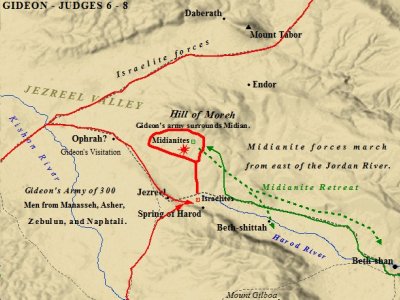
Gideon prepared to attack the Midianites by unifying the Tribes of Israel.
Judges 6
 Bible Battle REPORT
Bible Battle REPORT
Spring of Harod
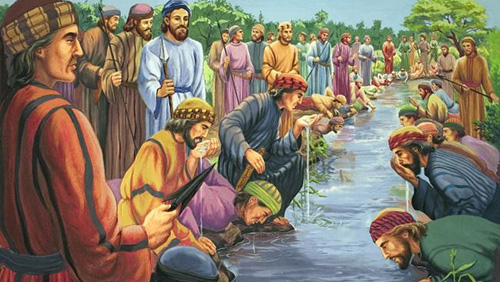
- The Midianites proceed with their frequent raids into Jezreel Valley, encamping at Endor.
- Gideon gathered a great force of 32,000 at Oprah 3. God told Gideon he had too many soldiers; this was comical in the natural. Here was Israel, the underdog fighting back and needing allies and God striping its forces. God instructed Gideon to send anyone who was afraid to fight home and, consequently, 22 companies went home, and ten were left. As if that was not bad enough, God said He would make the “final cut” down by the river!
- At Spring of Harod Gideon divided his force into three companies of 10,000 each. He himself took command of one company of 10,000 out of which 300 God divinely selected as an elite force for the initial attack. The men were drinking at the spring, and God told Gideon to send home all those that drank like dogs and to keep those using their hands. Only 300 men were left to fight, but God did promise victory with this remnant forces. At night Gideon was inspired to go on a spy mission with his armour bearer Purah. Gideon learned that the Midianite moral was broken because of a dream one of them had of defeat at the hand of Israel. Once Gideon knew the enemy was afraid he was fearless.
- The Midianites positioned their troops in a line (or succession of lines) bellow Gideon’s force. Gideon’s small force advanced to Tel Agol, divided yet again and approached the enemy from three different sides. Gideon waited for the right moment, which was during the changing of the Midianite guards. The Israelite fighters attacked before the new men had time to adjust their eyes to the darkness. They crept up behind the enemy camp with torches and caused a commotion by smashing jars and blowing horns.
- This fearless display caused havoc throughout the Midianite camp so that they pointed swords at each other and fled in terror.
- It was against this disoriented enemy in flight that the bulk of Gideon’s army engaged. Gideon’s main force smashed against the Midianite right flank.
 PRAISE & WORSHIP
PRAISE & WORSHIP
Lord, may the power of whose Spirit victories are won and strong-holds are broken down, blessed be your name. Great numbers in military strength arrayed against you are like butterflies my Lord. Because of your omnipotence, armies that are with you can easily be made spectators without any risk of losing. Great is your power, oh God. Those who put their trust in it shall be called “winners”. Judges. 7:7 4
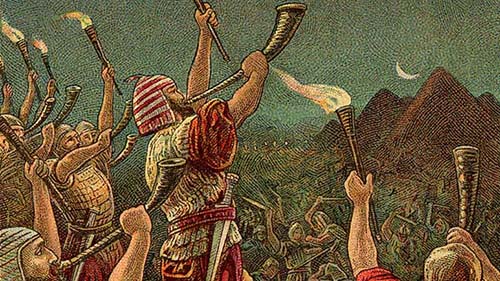
7. After successfully attacking the Midianites, Gideon activated the previously prepared reinforcement contingents from the tribes of Naphtali, Asher and Manasseh, thus exploiting this blessed window of opportunity and adding them to the fight.
8. The surviving Midianites continued the rout to Beth Shittah, Zererah and the border of Abel Meholah near Tabbath, which may have stopped the Midianites from dispersing effectively and fleeing directly westward.
9. Gideon tasked Ephraim to take over the fords of the Jordan at Beth Barah and cut off the remaining escape routes. Ephraim complied and captured two enemy commanders.
10. Gideon, troops, tired and hard pressed, resumed the chase and crossed the river westward. He swore revenge on the towns of Succoth and Peniel after they refused to resupply his company.
11. The surviving Midianite army consisted of 15 companies left out of an initial 120. They hoped to take up defences at Karkor, but the Israelites beat them there by using the caravan trails east of Nobah and Jogbehah. Gideon destroyed what remained of the enemy and took their kings, Zebah and Zalmunah, to slay before Succoth and Peniel. Gideon then had the towers 5.
Narrowing down Gideon’s troops
God guided Gideon to discharge two-thirds of his army. The text mentions the spiritual reasoning for this later but. The material rationale can lie partially in that an army of 32,000 would require a tremendous logistical effort that would slow it down. One can argue that, as God knew beforehand that Gideon would need to give speedy chase to the enemy, he needed to have a more mobile force. As it was, the troops still ran into low supplies near Succoth and Peniel but were still able to continue the chase. More troops may have resulted in their aborting the operation.
The choice of a reduced number as the advance force is also justified by the necessity of travelling quietly, swiftly and with less chance of discovery to their night attack. By descending on the Midianites at night, Gideon caught them uncounted and unprepared.
Gideon’s revenge – poetic justice
The Israelites were especially ferocious in dealing with the Midianites. Not only were the Midianites a traditional enemy of God’s people since the wandering in the Wilderness but they had during this period made their life miserable, bringing them to the brink of famine.
Gideon returned victorious through the Heres Pass across the Jordan River.
Notice that at the final stage of the Battle of Spring of Harod he used caravan routes to finish his enemy off. These were the same routes that the Midianites had used to torment the Israelites at the start.
 Bible Battles AFTERMATH
Bible Battles AFTERMATH
Spring of Harod
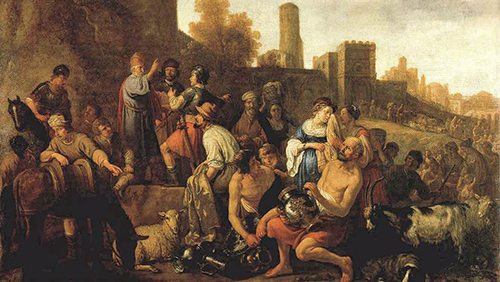
Payback time. Gideon took vengeance on the seventy-seven leaders of Succoth with a whipping with desert thistles. He then turned to Kings Zebah and Zalmunna and condemned them to summary execution as revenge for the death of his brothers at Tabor. It is generally an unspoken rule of war that a king does not kill a king. This rule is why Gideon gave his son Jether the task of execution, but he refused and so Gideon did it himself.
Gideon judge of Israel
With this victory, the people established Gideon in their hearts as their leader. They pleaded that he assume leadership over them. Gideon was quick to recognize that what the people needed was not a worldly leader but faith in their God. No matter what the circumstances Gideon knew that the as long as the people followed God’s precepts they would be all right.
Gideon takes the spoils
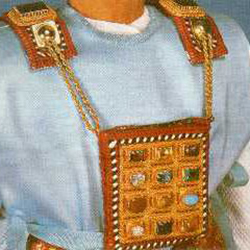
Gideon did
Gideon did prosper, and Israel was safe for decades to come but what could have been the beginning of a new godly course for The nation remained only a victorious hiccup in the history of this spiritual war.
Gideon succumbed to temptation and placed riches before God.
Judges 7
 SPIRITUAL WARFARE
SPIRITUAL WARFARE
Spring of Harod
Gideon and the Angel – fire from a rock
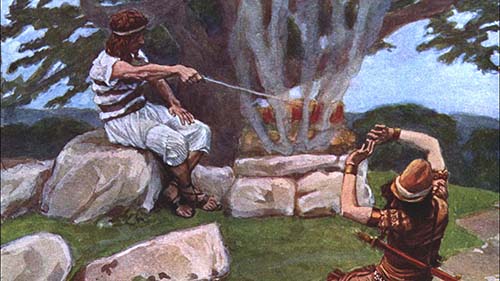
When the Angel of the Lord spoke to Gideon he gave him instructions:
Judges 6:20-23 NKJV “Take the meat and the unleavened bread and lay them on this rock, and pour out the broth.” And he did so. [21] Then the Angel of the Lord put out the end of the staff that was in His hand, and touched the meat and the unleavened bread; and fire rose out of the rock and consumed the meat and the unleavened bread. And the Angel of the Lord departed out of his sight. [22] Now Gideon perceived that He was the Angel of the Lord. So Gideon said, “Alas, O Lord God! For I have seen the Angel of the Lord face to face.” [23] Then the Lord said to him, “Peace be with you; do not fear, you shall not die.”
Rock: Word of God
Fire: Holy Spirit
Broth poured out: Jesus blood poured out for us.
Meat burned up: the sacrifice of Jesus body.
As the Angel of the Lord was pre-incarnate Jesus so was salvation through him. “You shall not die” speaks of greater salvation than deliverance from battle.
Israel’s fear of the Midianites – calling Gideon
When the Midianites were harassing the Israelites, they cried out to God, who answered by sending a prophet who reminded the people of God’s faithful protection and their unfaithful disobedience. Their worldly fear of the Amorite principalities weakened their faith and sense of identity in who they were in God. Their shield of faith was down, and the enemy overtook them. God knew who Gideon was better than Gideon knew himself.
When Jesus showed up (the Angel of the Lord), Gideon had no choice but to lose fear. God is love, and there is no fear in love.
1 John 4:18 There is no fear in love, but perfect love casteth out fear: because fear hath torment. He that feareth is not made perfect in love.
Once God, through the pre-incarnation vision of Jesus showed up, there was light at the bottom of that hole in the ground where Gideon was.
1 John 1:5 […] God is light, and in him is no darkness at all.
With that, a frightened Gideon became bold in a flash, and he used it.
Boldness of Gideon
Gideon was bold towards God when he asked where were the miracles He promised.
Gideon was bold and asked him, straight out, about the miracles that he had heard his elders speak of – he was referring to Egypt and the rest. This doubt was appropriate because Gideon was part of a generation out of touch with God (sound familiar?). Nevertheless, he had enough teaching from his parents to listen to God; to take what God said at face value.
Proverbs 22:6 Train up a child in the way he should go: and when he is old, he will not depart from it.
At this junction Gideon had faith in the existence of God but not in the power of God. He was saying, like so many people today: “if God is there why does he allow evil”?
Gideon’s warm doubt
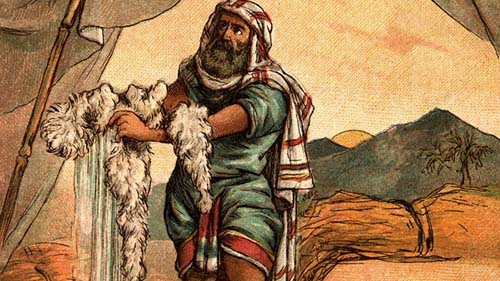
Gideon had no idea how he was going to accomplish this great feat. We often do not know how God will bring us from glory to glory (2 Corinthians 3:18). We need not think about that but, instead, have faith that God will not abandon the perfecting of our being.
Philippians 1:6 Being confident of this very thing, that he which hath begun a good work in you will perform it until the day of Jesus Christ.
Even after God spoke to him, Gideon took pains to assure himself that he had heard correctly from the Almighty before engaging the enemy. Indeed it was the commander in chief, the Holy Spirit, who directed the warrior.
God meets us where our faith is
God likes that attitude of boldness towards Him when it is genuine. He does not particularly care about our knowledge as much as he cares about our faith and our attitude. It is the heart that counts. If a man does not know anything about God but trusts him enough to say “where are you?” God will respond.
Many Christians put our “fleeces” to get answers from God by looking for exterior signs; this is not the highest flow. We have the inward witness of the Holy Spirit, which is what we should use to guide our life. The Devil can manipulate signs and wonders, but he cannot violate the inward witness within us.
God got rid of any soldier that was afraid to fight. In the end, Gideon had 300.
Judges 7
Gideon’s 300 – Numbers for bravery
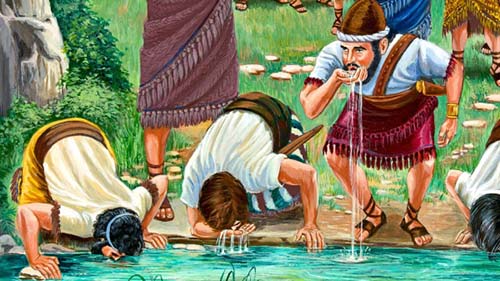
With the first intervention before the Battle of Spring of Harod, God got rid of all those who were afraid to fight; with the second, He got rid of all those that were inadequate. Perhaps a soldier drinking, using his hands, with his face held up spoke of his vigilant nature – he would not bring his eyes down – as opposed to the soldier that kept his face by the water as he drank.
1 Corinthians 1:25 […] the foolishness of God is wiser than men; and the weakness of God is stronger than men.
We hear many times, in military history of brave actions performed by a detachment. A detachment is, of course, a small part of the main army which is given a specific task in a battle. How that differs here is that however small, that detachment can still count on the army to send reinforcements. Here the situation is inverted: it is the bulk of the forces that God detached from the 300 who became the sole fighting force in the initial stage.
The wisdom of God comes through in that He cut away the majority of the army but not the bravest.
Why did God reduce Gideon’s forces?
The drastic reduction of the force served to strengthen the testimony and faith of those involved. Even in the purely military analysis, this has merit. The bravest men stayed. Many were afraid. Any student of military history knows that fear is contagious. In many armies, during war, cowardice was punished by death.
Gideon’s 300 soldiers remind us of Abraham’s 318 fighters at the Battle of Siddim. Here the men were selected from Abraham’s household. Here too the elite force was selected for battle according to their dedication to Gideon, to how close they followed the mantle upon him.
It is evident in many instances that God likes using comparatively small numbers to do, or initiate, His work. This Battle of Spring of Harod of Gideon is the most famous illustration of this character in God although such examples are not limited to the Old Testament.

POINT
God wants to ignite a few for the benefit of the many. At Pentecost (Acts 2), one hundred and twenty were ignited with the Holy Spirit, and in 9 months Jerusalem had sixty thousand believers. Sometimes it is not more people that we need but the right people.
Gideon’s cold faith – trusting God
Gideon may have needed a few exchanges to be convinced but, when he was, then he made up his mind to trust God no matter what.
The fact that Gideon dismissed the men that left so emotionlessly spoke of his quality as a commander but mostly of his faith. He did not grovel at them because God was His fighting supply, not the soldiers. He knew victory was His through God regardless of the desertions.
Like in today’s church, when someone leaves, a spiritually mature pastor is not afraid of offending people and knows God will replace the missing “bricks”.
Gideon listens to God – using information correctly
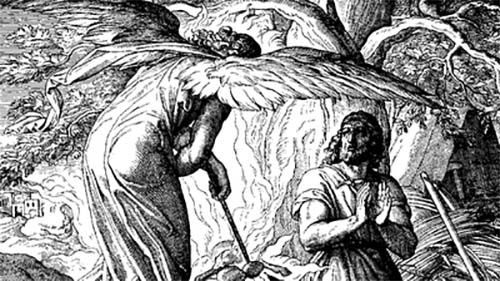
When God spoke to Gideon and told him to use 300, he could have easily caved in if it were not for his faith. Gideon could have assumed, that he only had 300 men at his disposal. That would have been reading too much into it because, as it turned out, God provided the people of Ephraim to join the fight upon the flight of the enemy. They were the ones who took over the first enemy ground.
Had Gideon read too much into God’s initial instructions he would have fallen into an incorrect assumption. Gideon followed God, took Him at His word, and waited to see what God would do. Assured of victory, the commander knew what God was going to do and left the how up to Him.
Our task, when God reveals something, is to be faithful with what we have. We can ask for clarity, for more information or confirmation but we must not doubt
Offence of Ephraim at Gideon
Scripture records that Gideon called on Ephraim later in the Battle of Spring of Harod, to secure the river fords. The Bible projects Ephraim, in different episodes, as a sensitive tribe, prone to offence. The inter-tribal rivalry may have been why Gideon only called Ephraim as a last resort 7. The Ephraimites became exceedingly jealous after they defeated the enemy at Beth Barah. They compared themselves with all the other tribes engaged in the conflict (including Gideon’s) and took offence at the fact that they had not been deployed in combat sooner.
Satan often tries to derail a vital enterprise, right at its crucial moment. The securing of the fords marked the middle of Gideon’s great battle. This operation was the decisive point, the turning point of the entire war with Midian. If Gideon became embroiled in a fight with the Ephraimites, then he would not have given chase to the enemy, and they would have been able to regroup, recover and strike again at a later time.
Ephraim angry at Gideon
Offence came to Ephraim right after they won their fight and right at the peak of strategic decisiveness. As it was, Gideon immediately kept offence from taking root in him. He used wisdom by alluding to Ephraim’s great feat in destroying the enemy and capturing their commanders.
The Ephraimites were angry at Gideon for his exclusion of them in the original order of battle, but he pointed to what should matter to them: that they had captured the spoils of the enemy and the glory belonged to them.
Many times, it is right after they deal with a specific problem and defeat their obstacles that Christians keep themselves from receiving all that God has for them. Like Ephraim, we can become focused on our role instead of on the overall joint effort in God’s kingdom; focused on us instead of on God; on the creation, instead of the creator. Ephraim had a critical job: to impede the enemy from escaping and thus being able to turn again against Israel at a later time. The Ephraimite offence speaks of the times when we think our job is unworthy or of little account when, within God’s plan it makes perfect sense, and it is the job for us.
Supply in Heaven – God helps Gideon
Gideon had lost most of his men to fear. After that God reduced his army even further! What was he doing? It seemed that what God was doing was reducing, but He was increasing. He was increasing the supply to Gideon in the heavenly realms just when he needed it the most 8.
It is at these times that God usually unleashes that supply. He was, consequently, increasing Gideon’s faith. The mind may look upon a situation as a reduction but, as long as we are following the Holy Spirit, it will always be an increase, no matter what it looks like from the outside.
God meets us where we are at as long as we recognize him for who He is. Whatever his doubts or simplicity of mind, Gideon always knew God was in control. He knew Gideon’s nature and wasn’t afraid to accommodate it. Gideon had requested multiple confirmations from God that he was even supposed to lead Israel. When he agreed God rewarded him by cutting up his attack force to a fraction of what it was. God wanted to assure his obedient son that he would be able to do the task and so gave him the assurance he needed by arranging enemy information to fall on his hands. Gideon did not have much faith, but he had just enough for God to work with.
Pattern of preemptive strikes
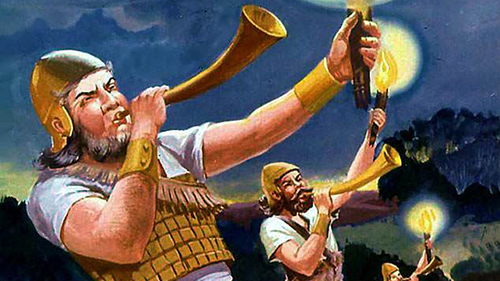
The battles of Gibeon, Waters of Merom, Kishon River and Spring of Harod all had a particular strategy in common. In all cases, God’s Army attacked the enemy before the expected battle. Their commanders, Joshua, Caleb, Deborah, Barak and Gideon did not wait for the enemy to begin moving but jumped on them before they were ready. Most likely, if the Israelites had waited, they would have lost. They denied the enemy an opportunity to decide on a manoeuvre.
In our spiritual warfare, we must also not let the Devil gain a foothold.
Ephesians 4:27 AMPC: Leave no [such] room or foothold for the devil [give no opportunity to him].
Gideon’s small force had nothing but to make noise and use light effects that they made the enemy flee in terror. That is what the Devil does when we resist him. He flees in terror, no matter how small we are in the natural.
James 4:7 AMPC: So be subject to God. Resist the devil [stand firm against him], and he will flee from you.
Thayer’s definition equates “flee” with: to be saved by flight, to escape safely out of danger.
We are the ones who pose a danger to the Devil. Not the other way around.
Gideon keeps the spoils
We know that God cares for details. For instance, we see how carefully He instructed the people on the construction of the Tabernacle. Well, the Devil is in the details. He will work with whatever he has.
1 Corinthians 5:6 NLT Your boasting about this is terrible. Don’t you realize that this sin is like a little yeast that spreads through the whole batch of dough?
Gideon’s big mistake here was to think that once he had accomplished the big job in a godly way, he could do the smaller one in his way.
He either:
(a) did not recognize the evil nature of a smaller issue of collecting plunder; or
(b) permitted himself to be slack with a smaller thing.
There is no doubt that Gideon was an obedient child of God. However while he recognized Israel’s national enemy in the Midianites and God’s sovereignty in his nation’s future, he failed to recognize the spiritual nature of this warfare. Gideon’s act of materialism in coveting the golden spoils of war was more than that; it was replete with a spiritual charge that was not of God.
Gideon worships idols
Gideon went to great lengths to eliminate the enemy from the land, but he did not eliminate the spiritual forces that propelled that enemy. Whatever was in the air after the Battle of Spring of Harod remained there. The evil spirits remained in the spoils of war. So much so that the blood on Gideon’s sword was not even dry after the battle before he took an idol image to adorn his home.
It must have not even dawned on him that, before the battle, he was destroying the demonic images and now he took one of them, though smaller, into his home. Perhaps he did not measure the consequences of this action, but what he took into his home he took into his heart.
Gideon obeyed God initially as he trusted the Angel of the Lord but afterwards he let the flesh take over.
Judges 7
The enemy comes to kill, steal and destroy
Satan comes immediately to destroy anything good that a believer takes hold of but fails to grasp.
Mark 4:14-15 [14] The sower soweth the word. [15] And these are they by the wayside, where the word is sown; but when they have heard, Satan cometh immediately, and taketh away the word that was sown in their hearts.
It is true that in the big arena he gave God
the glory. However, he let a smaller thing – the desire for recognition – be
his spiritual disgrace. Gideon did not want much after serving God. He merely
wanted a little bit of glory in his little corner of the world.
Carnal desire was the weak part in Gideon’s unprotected heart which Satan eventually exploited.
Song of Songs 2:15 Take us the foxes, the little foxes, that spoil the vines: for our vines have tender grapes.
Over time, the little foxes are as dangerous as the big ones.
We should vet our thoughts to make sure that they are not carnal because even the smallest worldly thoughts may lead to bigger sin. Sometimes the thought might have been placed there by the Devil all along for his designs on your life. There are churches where a pastor starts living in sin. The pastor has a higher spiritual authority, but this goes both ways: good and evil. Whatever is on the pastor will get on the congregation.
Undefeated enemy
God’s people had arrived at oppression from the Midianites because of pagan worship. Gideon won for them a great victory but eventually, years later, led them back into the same customs. He brought his entire legacy to naught by his impulsiveness.
The enemy always comes to steal and destroy. Satan came to steal the victory that Gideon had secured through virtue by using his distraction with the flesh.
What we have to learn from this is that the enemy is undefeated in this world since sin came into it through Adam. He will keep coming back and back until he destroys something. Here is another difference between God and Lucifer. God is only satisfied with total victory; with perfection. Satan, in his mediocrity, is content with any level of victory he can get away with; as long as he ruins something he is happy.
Concluding lesson – obedience to God
Gideon is a very close parallel to the Christian in this post-resurrection dispensation:
- We are at a crisis.
- The majority of people have a distant view of God.
- God still asks something of us; we have a role to play if we are willing to listen.
- God meets our faith where it is.
- We are told to lean not on our understanding or resources but to trust God completely.
- Our attitude will dictate the relationship we have with God.
- God will use us, no matter where we are, if we are willing.
- We must give Him the glory always and allow him to guide our lives through the spirit.
 Bible Battle ON LOCATION
Bible Battle ON LOCATION
Spring of Harod
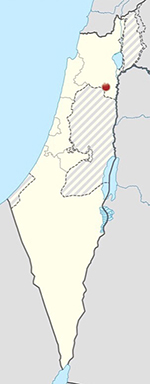
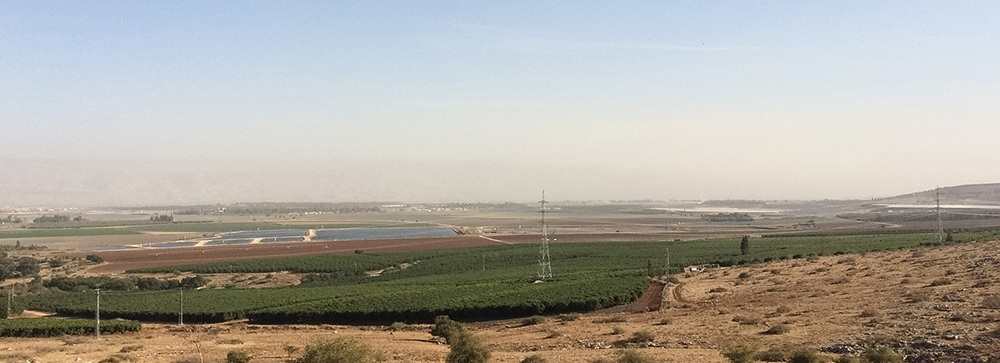
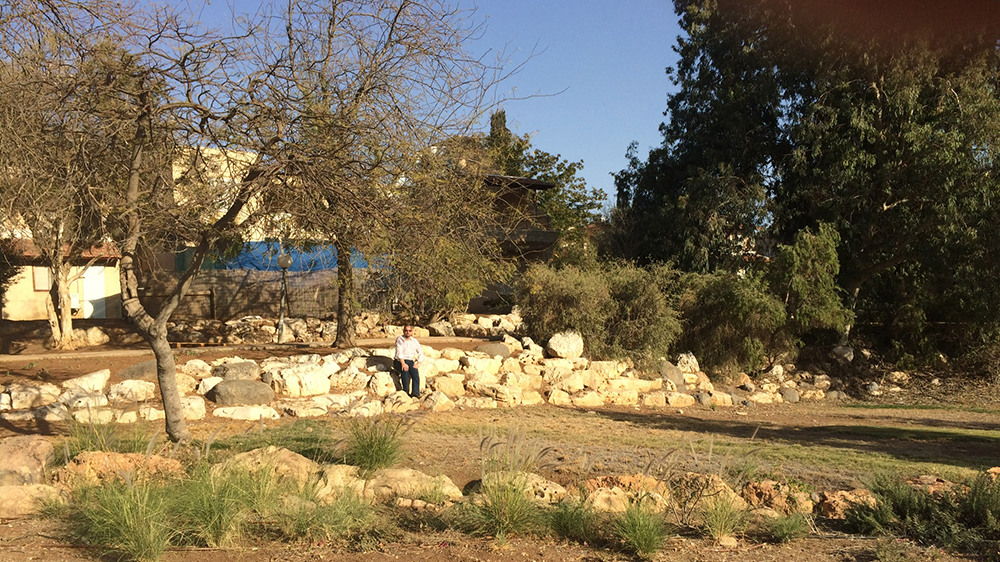
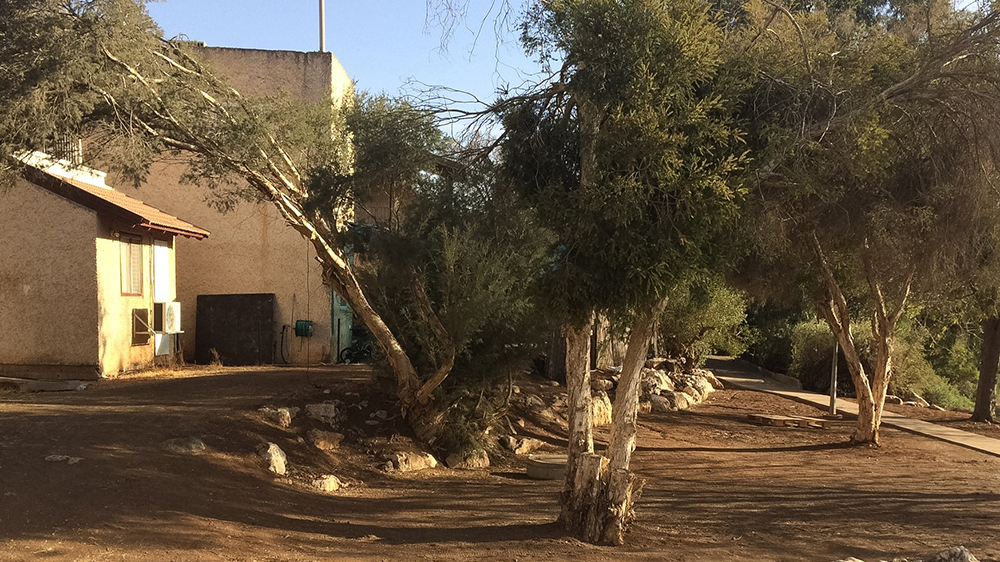
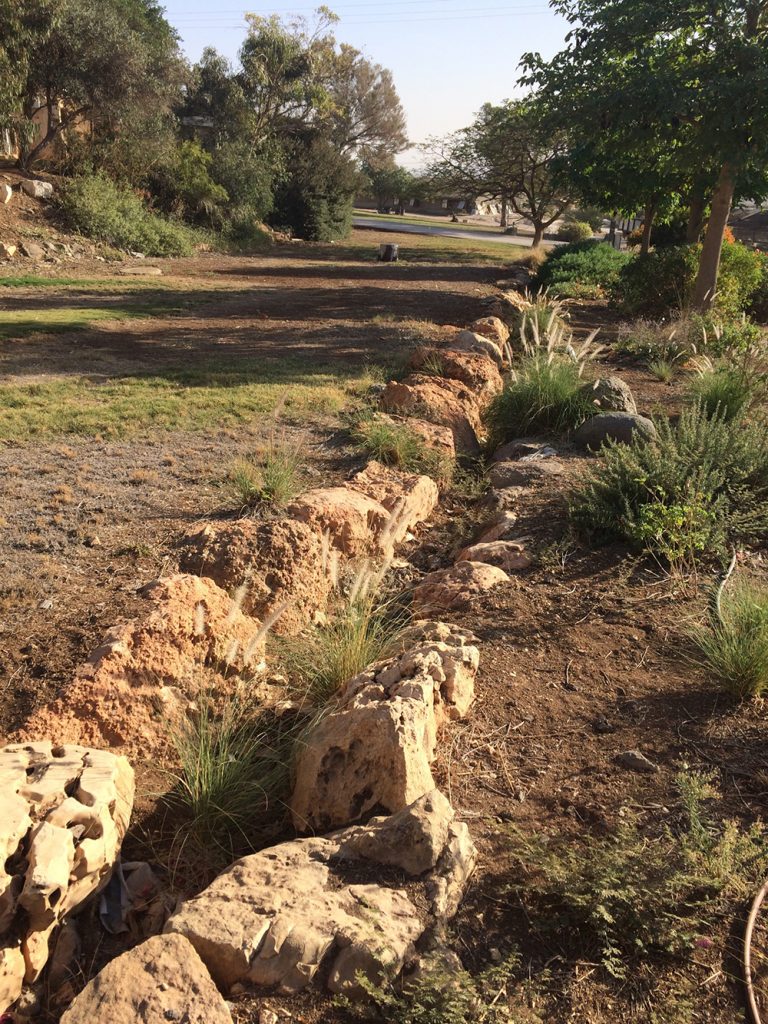
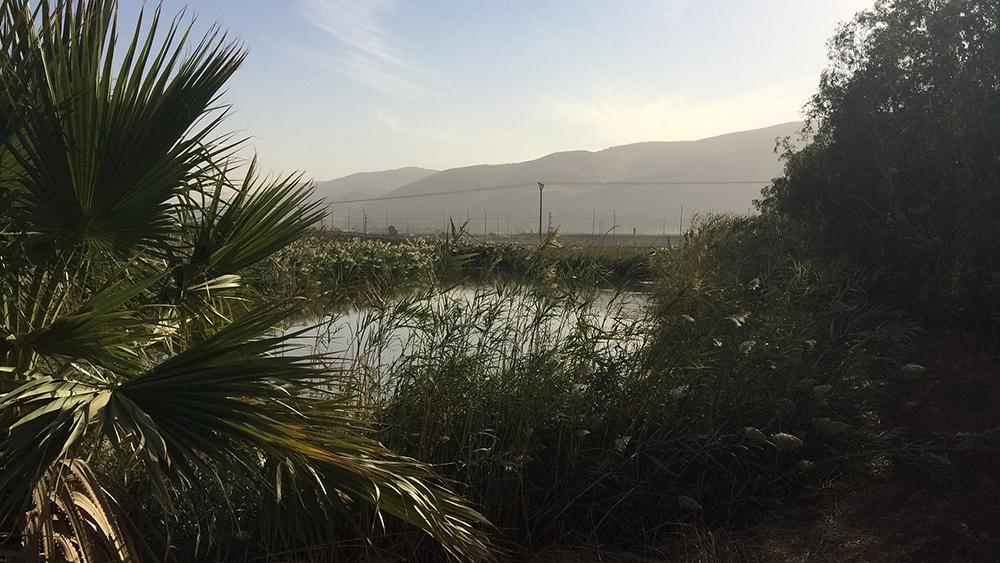
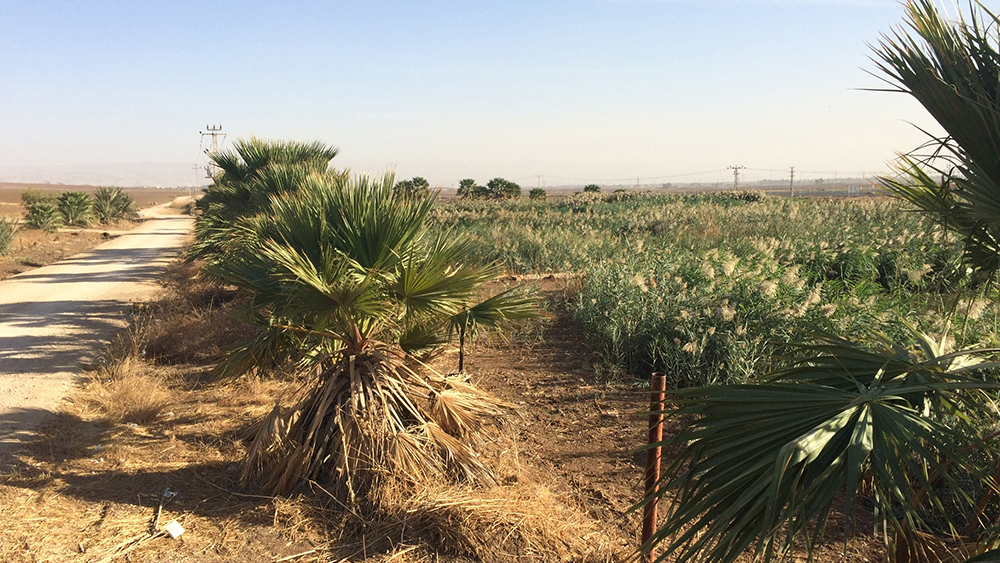
 Bible Battles TIMELINE
Bible Battles TIMELINE
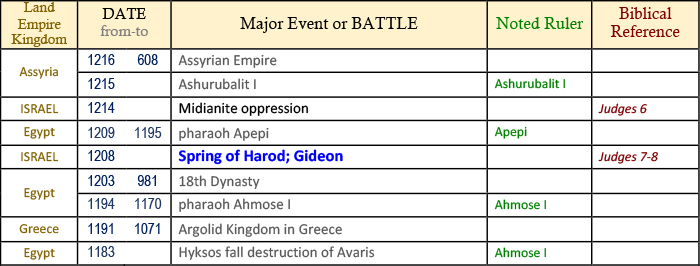
This world history timeline shows ancient calendars dates prior to 664 BC based on Rohl’s New Chronology. Why we chose this timeline? See summarized explanation in the Chronological Discrepancies chapter.
- Amalekites also known as Agagites – all their kings were called Agag – resided, at that time, in Bene Qedem.
- This entire group of different peoples is referred to as “easterners.”
- Perhaps present-day Afula.
- Trevor M Chase
- Towers in ancient towns were the most secure and strategic point. It allowed citizens to view the surrounding countryside and defences as well as take refuge when under attack. To lose a tower would set a community back years.
- The ephod could have been a priestly golden garment but, most likely, it was an idol of some sort
- Herzog and Gichon.
- Nancy Dufresne.
